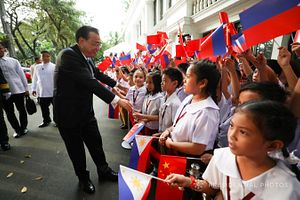One of the many agreements reached between China and the Philippines last week following a November 15 meeting between Chinese Premier Li Keqiang and Philippine President Rodrigo Duterte in Manila was one on defense industry cooperation between the two countries. Though few specifics were publicly disclosed by both sides and limits remain on potential progress in this area, the development bears watching within the broader context of the nascent but growing Sino-Philippine defense relationship (See: “The Limits of Duterte’s US-China Rebalance”).
As I have emphasized before, though the Philippines, a U.S. treaty ally, has traditionally not had much in the way of a defense relationship with China, Beijing’s deepening security ties with the Manila have become a familiar story since Duterte took office last year. Even though progress has been much slower than the rhetoric might suggest, we have also admittedly seen forms of cooperation that were previously unthinkable, from deliveries of military equipment to closer coast guard cooperation and even law enforcement assistance (See: “What’s in the New China Military Assistance to the Philippines?”).
China has also continued to look for opportunities to make further inroads in its cooperation with the Philippines, including in areas such as maritime security, intelligence-sharing, and counterterrorism exercises. Such collaboration has so far remained quite rudimentary, even though officials have hinted that further incremental progress can be expected in 2018 in areas such as visits, exchanges, assistance, and basic training (See: “What’s Next for China-Philippines Military Ties?”).
So it was no surprise that defense cooperation featured as part of the Li-Duterte meeting last week as the Chinese premier visited Manila for this year’s round of regional summitry. The joint statement itself highlighted areas of cooperation in defense and law enforcement that have been in focus over the past few months, particularly Chinese counterterrorism and reconstruction assistance for Marawi City as well as construction of drug rehabilitation centers.
And among the fourteen agreements inked between the two sides – which were mostly focused on in the economic realm and covered areas ranging from infrastructure to intellectual property – there was also a pact inked on defense industry cooperation. An MOU was inked between the Department of National Defense (DND) and the State Administration of Science Technology Industry of the National Defense (SASTIND) which is the government agency responsible for defense industrial development and policy.
Few details were available on the specifics of the agreement. But the focus on defense industry collaboration itself is no surprise. As I have noted previously in these pages, this was also seen in a May agreement reached between DND and Chinese defense company Poly Technologies. That agreement also specified the exploration of areas such as defense trade and collaboration and potential technology transfer.
More broadly, as the Philippines looks to procure more Chinese defense equipment in the coming years, including through funding Beijing has previously offered for this purpose, Manila will no doubt consider options that could ideally lead to some form of technology transfer that will develop its own defense industry as well.































